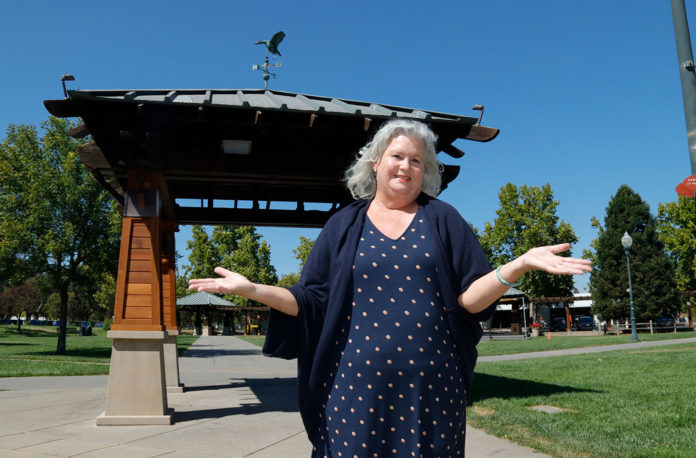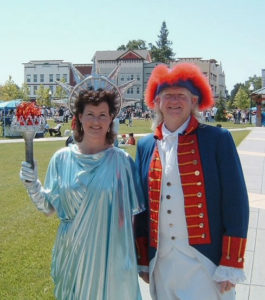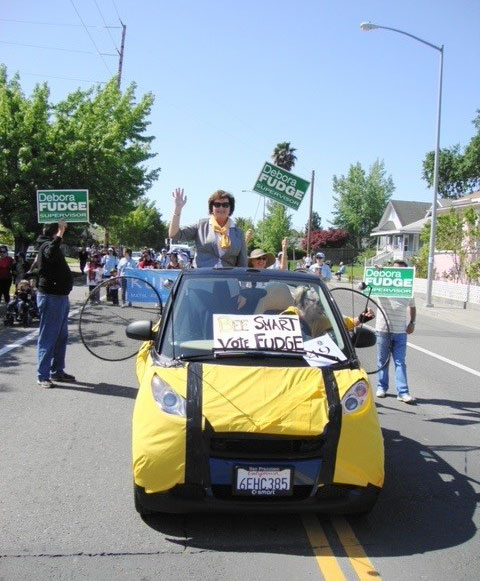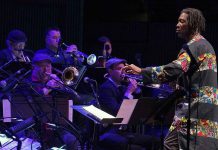
This is an expanded version of the interview with Debora Fudge that ran in the Aug. 15, 2024 print edition of The Healdsburg Tribune.
For the first time in 28 years, one name will be missing from the Windsor ballot for Town Council. Councilmembers in most towns and cities, including Healdsburg, generally serve one or two terms, rarely three or four. Debora Fudge has been elected to four-year terms on the council seven times, served as mayor six times, and is a long-time member of several key regional agencies—the SMART board, the Sonoma Clean Power and Sonoma County Zero Waste among others.
Along with Sam Salmon, who has served on the Town Council since 1994, Fudge has played a key role in shaping Windsor. (Salmon will be running for another term this fall.) With Fudge planning to step back from civic life, and heading out for a vacation in Europe this week, it seemed a good time to learn more about how she became so involved in Windsor and what she thinks of the town now.
When did you first arrive in Windsor, and what brought you here?
The story is I moved to Windsor in 1990, and we weren’t a town yet. And the county was approving a thousand homes a year up here with no real planning. Just, you know, suburban sprawl homes. And it was to the point where if you wanted to go grocery shopping at Raley’s, which was our only big shopping store, you had to go at 10:00 at night so you didn’t have to stand in lines.
There was no city-centered growth pattern to the development. It was just subdivisions. So I have a planning background—I worked as a state planner in the early 1980s, and my master’s degree is in planning [UC Davis]. And so I moved here and thought I could contribute, but I didn’t really know anybody in 1990.

So in 1994 when Sam [Salmon] was elected, he put an ad in the water bill that said he was looking for a planning commissioner. And I applied, went through some interviews with him and a couple of others, and he chose me. And I was happy to be able to contribute.
I know Windsor was incorporated as a Town in 1992—why is it a “Town” and not “the City of Windsor”?
The original people on Town Council in 1992, and others as well, decided that we always wanted to remain a small town, have a small-town atmosphere. And so if we called ourselves a town and reined in growth as compared to what was happening up here, then we would maintain that small-town quality of life. We didn’t want to be Modesto. We didn’t want to be what Rohnert Park was at the time. We specifically wanted to be different.
Do you feel that you, and the others who have worked with you along the way, have been successful in your goals?
We’ve won a lot of awards for what we’ve done. It’s been purposeful development. The City Council and planning commissioners have for over 20 years gone to Smart Growth conferences so that we could create visions for our town ahead of time. And then when developers would come speak to us, we would say, ‘Here’s our written plan, here’s our written vision for what we want to become.’ And they would need to go along with the program in order to build here.

We planned ahead what we wanted to be. We laid out streets for them in some cases, and we laid out the Town Green ourselves ahead of time, and now we want development around it. We did that ourselves as citizens.
When we go to these conferences, I don’t see City Council people and planning commissioners from other Sonoma County cities.
It sounds too good to be true, which means it probably is. Haven’t there been some rough patches?
Lynn Morehouse, Sam and I became the environmental majority in November of 1996. And that’s when we created larger change. That’s when we specifically started working on these smart-growth initiatives and creating the Town Green. So Lynn was a big part of those days, too.
Then Lynn, Sam and I went through a recall election in part over whether to build the downtown Town Green and change the development pattern here. The ’90s in Windsor, it was a Wild West town. I mean, the old timers that lived here in the ’90s were threatened by change. They didn’t understand what the impact would be. They’re happy now for the most part, but I understand how they felt at the time.
[That special election, held in January, 1998, failed to recall any of the councilmembers, and instead approved an Urban Growth Boundary, or UGB, with 72% in favor. It was renewed in 2018.]
Under court order, in 2020 the Town of Windsor (population 26,340) was divided up into five districts, each electing its own councilmember; the mayor is elected “at large,” from all districts. How has that worked out—the division of Windsor into districts for Town Council elections?
I don’t think the division of Windsor into districts has worked well at all. It’s been very frustrating. Even to find enough people to run in the correct district, for one thing.
Windsor doesn’t feel divided up into districts, you know—we feel like a whole. We were forced to go to districts because of a lot of lawsuits that were happening statewide. And we didn’t really have a choice. And if we had fought it, it might have cost us $400,000 or more, and we would’ve likely lost. So, I don’t think districts have worked out very well.
There’s no going back now, because the lawsuits are still out there pending. For instance, Santa Monica has spent $20 million fighting going to districts. And there’s still appeals going on, and we just can’t waste our money on that.
You and Sam Salmon have become very durable figures in this town, if not personalities or characters. You’ve both served about 30 years—why do you think that is? It’s pretty unusual.
It is. I think it’s because the people here can see what we’ve done over the years. It’s very visible. You can see our downtown, you can see our Town Green. You can attend the Concerts on the Green. You know, the train is coming! [SMART] . And those are all things that I’ve worked on. And he’s worked on most of them, too.
We’re a young city, so the changes were very evident. When you’re a councilmember in an older city, you’re sort of maintaining that city, you’re not always creating something. And I think we created something really special here.








